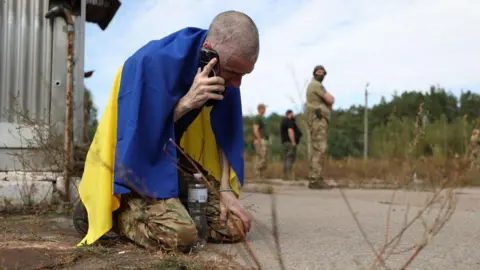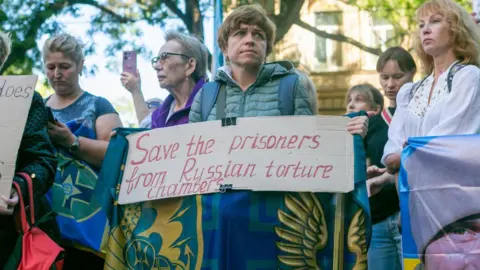Ukrainian sniper Oleksandr Matsievsky was captured by Russians in the first year of the full-scale invasion. Later, a video emerged showing him smoking his last cigarette in a forest, apparently next to a grave he had been forced to dig.
“Glory to Ukraine!” he says to his captors. Moments later, shots ring out and he falls dead.
His execution is one of many.
In October this year, nine captured Ukrainian soldiers were reportedly shot dead by Russian forces in Kursk region. Ukrainian prosecutors are investigating the case including a photo showing half-naked bodies lying on the ground. This photo was enough for one of the victims, drone operator Ruslan Holubenko, to be identified by his parents.
“I recognised him by his underwear,” his distraught mother told local broadcaster Suspilne Chernihiv. “I bought it for him before a trip to the sea. I also knew that his shoulder had been shot through. You could see that in the picture.”
The list of executions goes on. Ukrainian prosecutors are investigating reports of beheadings and a sword being used to kill a Ukrainian soldier with his hands tied behind his back.
In another instance, a video showed 16 Ukrainian soldiers apparently being lined up and then mowed down with automatic gunfire after emerging from a woods to surrender.

Some of the executions were filmed by Russian forces themselves, while others were observed by Ukrainian drones hovering above.
The killings captured on such videos usually take place in woods or fields lacking distinctive features, which makes confirming their exact location difficult. BBC Verify, however, has been able to confirm in several cases – such as one beheading – that the victims wear Ukrainian uniforms and that the videos are recent.
Rising numbers
The Ukrainian prosecution service says that at least 147 Ukrainian prisoners of war have been executed by Russian forces since the start of the full-scale invasion, 127 of them this year.
“The upward trend is very clear, very obvious,” says Yuri Belousov, the head of the War Department at the Ukrainian Prosecutor-General’s Office.
“Executions became systemic from November last year and have continued throughout all of this year. Sadly, their number has been particularly on the rise this summer and autumn. This tells us that they are not isolated cases. They are happening across vast areas and they have clear signs of being part of a policy – there is evidence that instructions to this effect are being issued.”
International humanitarian law – particularly the Third Geneva Convention – offers protection to prisoners of war, and executing them is a war crime.
Despite this, Ramzan Kadyrov, the strongman leader of Russia’s Chechnya, briefly ordered his commanders involved in the Ukraine war “to take no prisoners”.

Impunity
Rachel Denber, Deputy Director of the Europe and Central Asia Division at Human Rights Watch, says there is no shortage of evidence supporting allegations of Ukrainian prisoners of war being executed by Russian troops. According to her, impunity plays a key part, and the Russian army has some serious questions to answer.
“What instructions do these units have, either formally or informally from their commanders? Are their commanders being quite clear about what the Geneva Conventions say about the treatment of prisoners of war? What are Russian military commanders telling their units about their conduct? What steps is the chain of command taking to investigate these instances? And if higher ups are not investigating, or not taking steps to prevent that conduct, are they aware that they too are criminally liable and can be held accountable?” she asks.
So far, there has been nothing to suggest that Russia is formally investigating claims that its forces have been executing Ukrainian prisoners of war. Even mentioning similar allegations is punishable by lengthy prison sentences in Russia.
According to Vladimir Putin, Russian forces have “always” treated Ukrainian prisoners of war “strictly in line with international legal documents and international conventions”.
Ukrainian forces have also been accused of executing Russian prisoners of war, but the number of such claims has been much smaller.
Yuri Belousov says that the Ukrainian prosecution service treats such accusations “very seriously” and is investigating them – but so far no one has been charged.
According to Human Rights Watch, since the full-scale invasion began in February 2022 the Russian forces have committed “a litany of violations, including those which should be investigated as war crimes or crimes against humanity”.
The Russian army’s record of abuses is such that some Ukrainian soldiers prefer death to capture.
“He told me: Mum, I’ll never surrender, never. Forgive me, I know you’ll cry, but I don’t want to be tortured,” Ruslan Holubenko’s mother says. Her son is still officially classed as missing in action, and she hopes against hope.
“I’ll do everything that’s possible and impossible to get my child back. I keep looking at this photo. Maybe he is just unconscious? I want to believe, I don’t want to think that he’s gone.”



